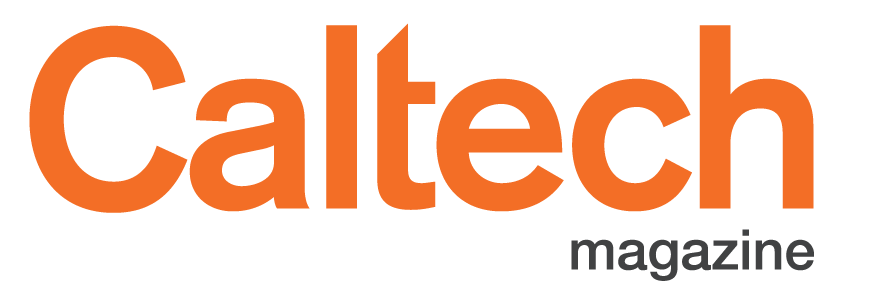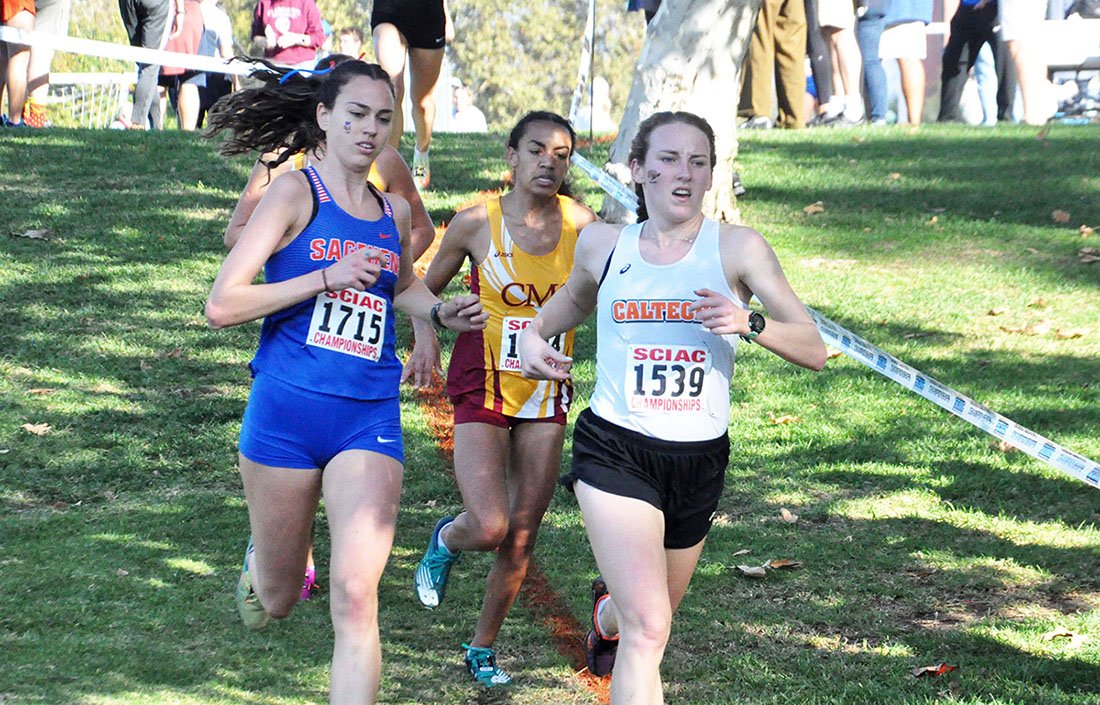Sidelined by COVID, Graduate Student-Athletes Get Another Shot to Compete
Two student-athletes who saw their senior seasons canceled because of COVID-19 are getting a second chance to compete and break records, this time as Caltech graduate students.
By Marisa Demers
Margaret Trautner (right). Image: Caltech Athletics
Margaret Trautner, a computing and mathematical sciences graduate student, will vie for a title in the 800-meter and 1,500-meter runs at the NCAA Division III Outdoor Track and Field Championships in Geneva, Ohio, from May 26 to 28. Trautner has competed on a national level six previous times, two with Caltech and four with her undergraduate alma mater. She is also the first graduate student to represent Caltech at a Division III championship.
Sam Solomon, a medical engineering graduate student, used his final year of NCAA eligibility to dive with the Caltech team in the 2021-22 season. In February, he placed first on the 1-meter springboard and runner-up on the 3-meter at the Southern California Intercollegiate Athletic Conference (SCIAC) championships. With these dives, Solomon broke Caltech’s oldest athletics records set in 1980 and 1981.
“COVID was a wrecking ball in so many ways, and I am glad that Caltech Athletics could help Margaret and Sam reclaim their passions,” says Betsy Mitchell, director of athletics, physical education, and recreation. “In turn, they are giving their teams great leadership.”
The NCAA typically gives student-athletes five years to play four seasons of their sport with the caveat that they must remain at their undergraduate institutions. In 2018, though, the collegiate sports governing body allowed Division III players to transfer their remaining eligibility to other Division III programs. Later, it also granted an extra year of eligibility to many student-athletes who saw their seasons cancelled during the pandemic. Those two rulings allowed Trautner and Solomon, who both graduated from MIT in 2020, to compete this past year as Caltech graduate students.
Caltech expects three to five graduate students to participate in Caltech varsity sports each year until 2025 when COVID-related eligibility expires, says Mark Becker, assistant director of intercollegiate operations. Typically, one or two graduate students play for Caltech teams.
Getting Their Senior Season Back
Sam Solomon diving. Image: Caltech Athletics
Trautner studies dynamical systems and what she calls the mathematical side of machine learning. She credits her adviser Andrew Stuart, Bren Professor of Computing and Mathematical Sciences; and Kelli Blake, cross-country and track and field head coach; for giving her the flexibility to be a researcher and an athlete.
“I remember asking Andrew if I could run track, and he said to me, ‘You get to have a life,’” Trautner grins. “Coach Kelli is also really understanding that I am a graduate student and lets me set my own schedule to be as efficient as I need it to be.”
For example, Trautner often trains while her computer is running a model, and she returns in time to review the results as soon as they are ready.
In his first year at Caltech, Solomon, who is developing wearable sensors, asked swimming and diving head coach Andy Brabson if he could help Brabson train the divers. At the time, he did not know he was eligible to compete. Once Brabson told Solomon he could be on the diving team, he joined and balanced his roles as teammate, informal assistant coach, and mentor.
“I have been competing since I was 5 years old, and it was just very sad that I could not finish all the way through as I had planned,” Solomon says. “Taking a year off is a long time in diving, but Caltech worked with me to get my dives back and have the ending I wanted.”
Balancing Studies and Sports
Sports have been part of Solomon’s and Trautner’s lives since they were in elementary school. Running provided an outlet for Trautner’s competitive drive, and MIT offered her an equally competitive track program that consistently ranked first in its conference. Through weightlifting, interval work, and sprint training, Trautner has continued to increase her speed. She now holds the Caltech record in the 1,500-meter, 800-meter, and 400-meter runs and is ranked fourth in the 800-meter dash among all Division III schools.
Solomon performed gymnastics for much of his childhood and, at age 17, he translated his elegance, strength, and tumbling skills into diving. By the time Solomon was in high school, he competed nationally in three different sports: diving, artistic gymnastics, and tumbling. Solomon’s specialty dive, which involves completing two-and-a-half somersaults with a twist before landing in the pool, helped him stand out at MIT and earned him a spot in the Division III Swimming and Diving Championships during his first three years there.
For both of these Caltech graduate student-athletes, carving out time to be in the pool or on the track is essential for their mental health.
“When I’m diving, I’m in an entirely different headspace,” Solomon says. “It’s a quick way to get out of the work mindset. I’m not focused on the lab experiment that failed that morning or the experiment I have planned for the next day. For two hours a day, I know I’m going to have fun with some great teammates and experience a rush of adrenaline.”
Adds Trautner: “I definitely subscribe to the philosophy of resting the mind by exhausting the body.”
The Caltech community can watch and get real-time results of Trautner’s performance at the national competition on the event website.


